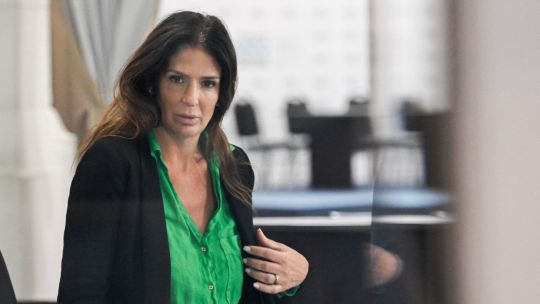
Julieta Makintach, the disgraced judge who caused a mistrial in the negligence case against the medical team in whose care football legend Diego Maradona died in 2020, has been removed from her post.
Makintach, 48, was one of three judges in the trial of seven medical professionals blamed by prosecutors for Maradona’s death while he was recovering from brain surgery for a blood clot after decades battling cocaine and alcohol addictions.
She recused herself after it emerged she had been interviewed for a miniseries about the case, potentially breaking a string of ethics rules. The trial was nevertheless annulled after two months and 40 witnesses – including Maradona’s grieving daughters – being heard.
On Tuesday, a special panel of judges, lawyers and Buenos Aires Province lawmakers unanimously removed Makintach from her post and disqualified her from holding any judicial position in the future. She did not attend the brief administrative hearing, which was held in a packed chamber in the provincial capital, La Plata.
Among those present were Maradona’s former partner, Verónica Ojeda, and their 12-year-old son, Diego Fernando, who embraced after hearing the verdict.
Maradona – considered one of the world’s greatest ever players – died aged 60 of heart failure and acute pulmonary oedema two weeks after going under the knife. He was found dead in his bed by a day nurse.
The footballer’s medical team is on trial over the conditions of his convalescence at a private home, and risk prison terms between eight and 25 years if convicted of “homicide with possible intent.” Prosecutors have described the football icon’s care in his last days as grossly negligent and said he was abandoned to his fate for a “prolonged, agonising period” before his death.
A new trial has been set for March 17, 2026, with a fresh panel of three judges. The mistrial wiped out more than 20 hearings’ worth of testimony, and several witnesses – including Maradona’s daughters Dalma, Gianinna and Jana – will have to testify again.
‘Mistake’
The case has focused on the decision by Maradona’s doctors to allow him to recuperate at home with minimal supervision and medical equipment instead of a medical facility.
Makintach had denied participating in, or authorising, any filming for a documentary about the case, but footage shared in Argentine media showed her allegedly being interviewed by a film crew on the eve of the trial.
Investigators later recovered the trailer for Justicia Divina during authorised searches, with prosecutors saying it showed the judge “strutting” through the courthouse corridors and included unauthorised images taken during closed-door hearings.
Prosecutors accused her of abusing state resources to promote a project to her own advantage and on Tuesday the panel found her guilty of negligence, dereliction of duty, breach of confidentiality and abuse of power.
During the impeachment proceedings, provincial prosecutor-general Analía Duarte accused Makintach of lying, exerting pressure, manipulating the process and using public resources for personal benefit.
Makintach claimed she did not know the interview, requested by a friend, was for a documentary, and apologised for her “mistake.”
“I apologise a thousand times to the [Maradona] family for failing to achieve what I wanted most, which was to deliver justice,” she told the panel in earlier hearings.
She remains under a separate criminal investigation for her conduct in the case and no longer benefits from the immunity attached to her former office.
Outside the courtroom, Ojeda said the ruling marked “five years of struggle for the family” and insisted Makintach “must face the consequences that correspond.”
Her lawyer, Mauro Baudry, welcomed the ruling and urged the courts to “turn the page” and concentrate on the new trial of the seven defendants facing homicide charges.
One of Maradona’s daughters, Gianinna, wrote on Instagram that regaining faith in Argentina’s justice system was “a relief for the heart” after “so much filth.”
Guillermo Sagues of the San Isidro Bar Association, one of Makintach’s accusers, told reporters her actions had “ridiculed” Argentina’s justice system. Her lawyers did not respond to requests for comment.
– TIMES/AFP
related news





